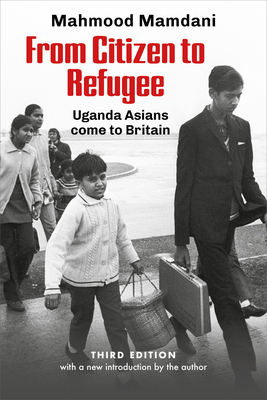From Citizen to Refugee: Uganda Asians Come to Britain

From Citizen to Refugee: Uganda Asians Come to Britain
In his introduction to this third edition, Mahmood Mamdani reflects on the lessons since the expulsion of Asians from Uganda. How come, he asks, over 90% of residents of the country, brown or black, would not want to return to the days and years before the 1972 expulsion? The expulsion cannot just be understood as an event that occurred in 1972. He concludes, tere is no one Asian legacy. There are several, and they are contradictory. Not all are legacies we would like to wipe out from our collective memories. Some we would like to build on; others we would like to reform. Uganda Asians are a poor fit as victims. In a land known for sporadic massacres, there were no massacres of Asians. When massacres happened, they were of 'indigenous' people. Mamdani begins to explore the theme of political identity - the colonial politicisation of racial identity and its reproduction after independence - which has been the concern of much of his subsequent work, notably the groundbreaking Citizen and Subject. This gripping and highly readable story of the Asians' last days in Uganda interweaves the stories of Mamdani's friends and family with an examination of Uganda's colonial history and the subsequent evolution of post-independence politics. The British colonial policy of divide and rule ensured that race coincided with class, effectively politicising the category of race. This vivid autobiographical account is as pertinent now as when the book was first published in 1973 in its telling of a story that will be familiar to refugees and those seeking asylum in Britain today.
PRP: 136.40 Lei
Acesta este Prețul Recomandat de Producător. Prețul de vânzare al produsului este afișat mai jos.
122.76Lei
122.76Lei
136.40 LeiLivrare in 2-4 saptamani
Descrierea produsului
In his introduction to this third edition, Mahmood Mamdani reflects on the lessons since the expulsion of Asians from Uganda. How come, he asks, over 90% of residents of the country, brown or black, would not want to return to the days and years before the 1972 expulsion? The expulsion cannot just be understood as an event that occurred in 1972. He concludes, tere is no one Asian legacy. There are several, and they are contradictory. Not all are legacies we would like to wipe out from our collective memories. Some we would like to build on; others we would like to reform. Uganda Asians are a poor fit as victims. In a land known for sporadic massacres, there were no massacres of Asians. When massacres happened, they were of 'indigenous' people. Mamdani begins to explore the theme of political identity - the colonial politicisation of racial identity and its reproduction after independence - which has been the concern of much of his subsequent work, notably the groundbreaking Citizen and Subject. This gripping and highly readable story of the Asians' last days in Uganda interweaves the stories of Mamdani's friends and family with an examination of Uganda's colonial history and the subsequent evolution of post-independence politics. The British colonial policy of divide and rule ensured that race coincided with class, effectively politicising the category of race. This vivid autobiographical account is as pertinent now as when the book was first published in 1973 in its telling of a story that will be familiar to refugees and those seeking asylum in Britain today.
Detaliile produsului










